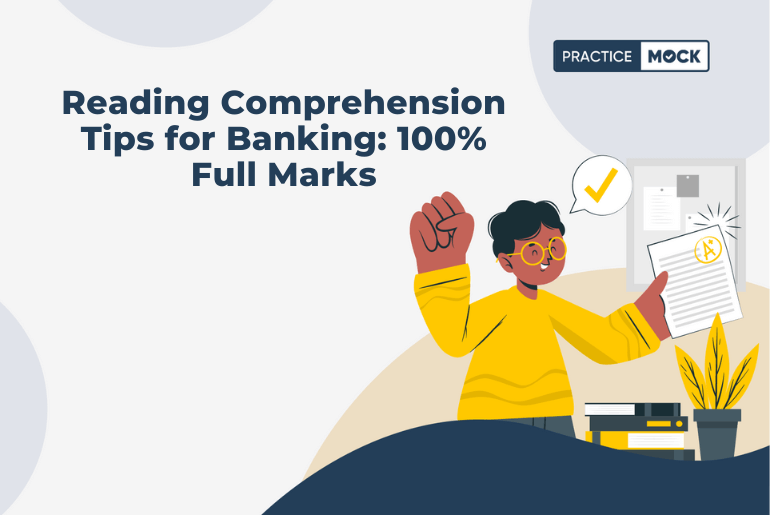Reading Comprehension is among the highest-scoring topics to cover in all government banking examinations. If you want to get through the sectional cut-off in the exam, practice solving reading comprehension regularly before exams. RCs are framed considering two important parameters to test the comprehension skills and vocabulary knowledge of aspirants appearing in any banking exam.
Signup to TAKE a FREE Mock & KNOW AIR
3-Step Approach to Attempt Reading Comprehension
IBPS Clerk aspirants from Hindi medium or those with low confidence to handle reading comprehension questions in prelims. These candidates can follow our 100% tried & tested 3-step approach to getting 100 full marks in reading comprehension to meet the prelims cut-off score.
Step 1: Read Comprehension Passage
The first step is to attempt reading comprehension questions to read the passage carefully. Understand what is the passage all out and then, go through the questions accordingly. Improve your reading skills by attempting comprehension questions regularly to score full marks.
Step 2: Sense Comprehension Passage Tone
While going through the reading comprehension, summarize the important points so that you can understand the passage easily.
Step 3: Understand & Attempt Questions
Once you finish reading and understanding the passage, it’s time to solve questions. Be careful in reading questions.
Practice Reading Comprehension Questions for Banking Exams
| 1 | Reading Comprehension Passage 1 |
| 2 | Reading Comprehension Passage 2 |
| 3 | Reading Comprehension Passage 3 |
| 4 | Reading Comprehension Passage 4 |
| 5 | Reading Comprehension Passage 5 |
10 Reading Comprehension Tips If You’re Running Out of Time
When you’re running out of time during a reading comprehension test, it’s essential to adopt effective strategies to maximize your understanding and answer questions efficiently. Here are 10 tips to help you tackle reading comprehension under time constraints:
Signup to TAKE a FREE Mock & KNOW YOUR AIR
- Skim the Passage First
Quickly read through the passage to get a sense of the main ideas, structure, and tone. Pay attention to headings, subheadings, and the concluding paragraph. - Focus on Key Sentences
Identify topic sentences in each paragraph, as they often contain the main idea. Also, look for transitional sentences that connect ideas within the passage. - Prioritize Questions
If you’re short on time, start with questions that are easier or have shorter answer choices. Prioritize questions that you’re more confident about. - Use Keywords
Pay attention to keywords in both the questions and the passage. These can guide you to relevant sections, making it easier to find the necessary information quickly. - Predict Answers
Before reading the answer choices, try to predict what the answer might be based on your understanding of the passage. This can help you eliminate obviously incorrect choices. - Don’t Reread Entire Passages
If a question refers to a specific part of the passage, focus on that section rather than rereading the entire passage. This saves time and helps you find the relevant information more efficiently. - Eliminate Incorrect Answers
Use the process of elimination to narrow down your choices. Cross out obviously incorrect options, even if you’re not sure about the correct answer. This increases your chances of selecting the right choice. - Manage Your Time:
Keep an eye on the clock and allocate time wisely for each passage and set of questions. If you’re spending too much time on one question, move on and come back to it if there’s time at the end. - Stay Calm and Focused:
Panic can lead to mistakes and slow you down further. Stay calm, focused, and confident. If you’re unsure about an answer, make your best guess and move on. - Practice Regularly:
Familiarize yourself with various types of passages and questions. Regular practice can improve your speed and comprehension skills. Use timed practice tests to simulate the actual testing environment.
Remember, the key is to strike a balance between speed and accuracy. Practice these strategies regularly to enhance your reading comprehension skills and perform well under time constraints.
How can you improve your reading skills?
- Read a variety of content including newspapers, blogs, and articles. Consider reading online content so that, you get well acquainted with the exam environment.
- Solve previous year’s reading comprehension questions to know questions papers and improve your speed.
- Try to cover RCs’ on different topics like banking, economy, environment, and social and political issues.
Signup to TAKE a FREE Mock & KNOW YOUR AIR
Final Words
Develop a regular reading habit to attempt RC questions in any banking exams. Solve RCs regularly to understand passage tone and improve attempts accuracy with speed. We finally wrap up our blog on Reading Comprehension tips with the hope these tips can help you improving scores in the actual exam. Good Luck!
- Sign Up on Practicemock for Updated Current Affairs, Free Topic Tests and Free Mini Mocks
- Sign Up Here to Download Free Study Material
Free Mock Tests for the Upcoming Exams
- IBPS PO Free Mock Test
- RBI Grade B Free Mock Test
- IBPS SO Free Mock Test
- NABARD Grade A Free Mock Test
- SSC CGL Free Mock Test
- IBPS Clerk Free Mock Test
- IBPS RRB PO Free Mock Test
- IBPS RRB Clerk Free Mock Test
- RRB NTPC Free Mock Test
- SSC MTS Free Mock Test
- SSC Strenographer Free Mock Test
- GATE Mechanical Free Mock Test
- GATE Civil Free Mock Test
- RRB ALP Free Mock Test
- SSC CPO Free Mock Test
- AFCAT Free Mock Test
- SEBI Grade A Free Mock Test
- IFSCA Grade A Free Mock Test
- RRB JE Free Mock Test
- Free Banking Live Test
- Free SSC Live Test




